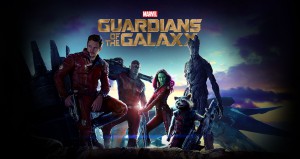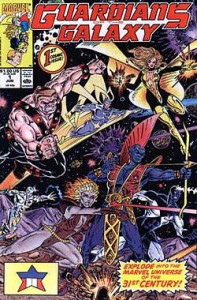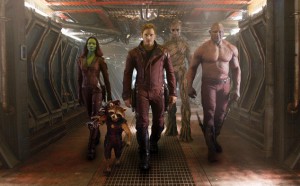Guardians of the Galaxy and The Marvel Method
 Disney keeps on truckin’ with the Marvel Studios films coming thick and fast, leaving bête noire, DC, submerged in a swamp, largely of their own making. Then again, DC has always done this since Marvel challenged their hegemony in the 1960s: playing catch-up, that is. Sure, DC have Arrow on TV, soon to be followed by The Flash, Gotham, Hourman and Constantine, but Marvel surge ahead with another new TV series, Agent Carter, and the five Netflix series coming next year (Daredevil, Jessica Jones, Iron Fist, Luke Cage and the ensemble team-up series, The Defenders), not to mention Avengers: Age of Ultron in 2015 and the forthcoming Doctor Strange and Ant-Man films.
Disney keeps on truckin’ with the Marvel Studios films coming thick and fast, leaving bête noire, DC, submerged in a swamp, largely of their own making. Then again, DC has always done this since Marvel challenged their hegemony in the 1960s: playing catch-up, that is. Sure, DC have Arrow on TV, soon to be followed by The Flash, Gotham, Hourman and Constantine, but Marvel surge ahead with another new TV series, Agent Carter, and the five Netflix series coming next year (Daredevil, Jessica Jones, Iron Fist, Luke Cage and the ensemble team-up series, The Defenders), not to mention Avengers: Age of Ultron in 2015 and the forthcoming Doctor Strange and Ant-Man films.
Further, Marvel are constructing a sequential tapestry unrivaled in cinematic history by drawing from the comic book concept of continuity and building a grand universe of interconnectivity and hyperdiegetic expansion. DC, on the other hand, have announced that their film and TV properties will probably be separate universes which indicates a lack of vision and something which irks this author greatly. I do not want to craft dubious assertions about the audience here, but my own research has shown that fans love hyperdiegetic continuity, something which DC fail to recognize again and again going back to the 1960s/70s and leading into the Crisis on Infinite Earths maxi-series which was created to (supposedly) streamline DC’s erratic and errant continuity. DC has periodically performed continuity cleansing operations in 1994 (Zero Hour: Crisis in Time), 2005 (Infinite Crisis/52) and 2011 (Flashpoint/The New 52) whereas Marvel’s continuity goes back to those early Timely Comics featuring the first iteration of Captain America, Sub-Mariner and the original Human Torch. Simply put, DC repeatedly pushes the reboot/reset button while Marvel has never resorted to such drastic tactics that often risks the ire of the fan culture by casting decades of comic material into the dustbin of history. Once again, DC are on the back-foot, defending rather than attacking.
Marvel’s latest film, Guardians of the Galaxy, is certainly another example of the studios’ risk taking, but this should not be surprising. As Marvel’s flagship characters, Spider-Man, X-Men and the ‘first family,’ The Fantastic Four, are unavailable due to a copyright deal that surely has Stan Lee weeping into his Hulk pajamas, Marvel Studios took a step into the unknown by using (then) B-lister, Iron Man, to launch their Cinematic Universe. Of course, we all know that casting Robert Downey Jr. as Tony Stark was a momentous decision and set the ground for what was to come. But even Iron Man had considerably more gravitas than Guardians of the Galaxy, a relatively unknown gang of motley mercenaries which includes Star Lord, Gamora, Drax the Destroyer, a talking tree creature named Groot, and Rocket Raccoon. In comic book lore, the Guardians is the second iteration of a team that first made its debut in 1969, but in current continuity, the revised roster has a relatively recent pedigree, first appearing in 2008. In 2012, as part of Marvel’s response to DC’s regenerative initiative, “The New 52,” Brian Michael Bendis began a new series featuring Rocket et al which has helped propel the intergalactic ensemble into the fan conscience.
 Still, a massive risk when one considers the fan-ghetto that is the contemporary comic book industry. Guardians does not come with a pre-built recognition like Iron Man, Hulk, or The Avengers. Many commentators agreed that Marvel Studios could be hoisted by its own petard by breaking free of the comfortable confines of branded characters and experimenting with lesser known fare. An early scene in the film operates as an arch-commentary on the unknown quality of these characters when Peter Quill fails to spark any recognition from one of Thanos’ henchmen. “I’m Starlord!” he says proudly, to which his pursuer responds emphatically: “WHO?” with a quizzical lack of comprehension.
Still, a massive risk when one considers the fan-ghetto that is the contemporary comic book industry. Guardians does not come with a pre-built recognition like Iron Man, Hulk, or The Avengers. Many commentators agreed that Marvel Studios could be hoisted by its own petard by breaking free of the comfortable confines of branded characters and experimenting with lesser known fare. An early scene in the film operates as an arch-commentary on the unknown quality of these characters when Peter Quill fails to spark any recognition from one of Thanos’ henchmen. “I’m Starlord!” he says proudly, to which his pursuer responds emphatically: “WHO?” with a quizzical lack of comprehension.
Any anxiety has surely been put to rest now as Guardians broke box-office records which demonstrates that the Marvel brand has become a trusted commodity rather than this-or-that superhero. But is the film any good?
Well, first and foremost, it has a raccoon who wields awesome weapons and has a penchant for wry doses of humor. That alone has me on-board. What is striking about this film, for this reviewer at least, is that it does not take itself seriously at all and fully embraces the absurd to deliver a fun-filled, comedy-laden adventure that DC’s audio-visual properties sorely lack. Even Man of Steel managed to take the most optimistic of superheroes and turn him into a dour, miserable facsimile imbued in the grim and gritty ambiance of The Dark Knight (I know, I promise I will stop with the DC/Marvel comparisons, but the former has colored me irritated). Conversely, Guardians is a romp: it is zany, silly and crafted with a nudge-nudge-wink-wink irony that had the audience spluttering popcorn and joining in a collaborative chorus of laughter that was joyful to partake in. There weren’t many laughs in Nolan’s Batman films or Man of Steel (there I go again!). Not that I am against the grim and gritty: Nolan’s films were astounding, a three-act epic that deserves the accolades.
Guardians acts as a kind of pilot for the team’s further adventures (which we are informed during the final credits “will return”) and the story presents an origin narrative for how the team first meet and begin to form an alliance. It is not until the film’s final act that the Guardians come together into a cohesive unit. This is, for all intents and purposes, “Guardians of the Galaxy: Year One.”
Did I mention the raccoon? With guns?




[…] productions. Sometimes, the fanatics* bring a pre-packaged audience that provides a kind of minimal guaranteed audience and an audience that can fill in narrative gaps lost in the special-effects orgy of many comic-book […]